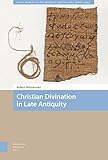Christian divination in late antiquity /Robert Wiśniewski ; translated by Damian Jasiński.
Material type: TextLanguage: English Original language: Polish Series: Publication details: Amsterdam : Amsterdam University Press, (c)2020.Description: 1 online resourceContent type:
TextLanguage: English Original language: Polish Series: Publication details: Amsterdam : Amsterdam University Press, (c)2020.Description: 1 online resourceContent type: - text
- computer
- online resource
- 9789048541010
- 9048541018
- BR195 .C475 2020
- BL613
- COPYRIGHT NOT covered - Click this link to request copyright permission: https://lib.ciu.edu/copyright-request-form
| Item type | Current library | Collection | Call number | URL | Status | Date due | Barcode | |
|---|---|---|---|---|---|---|---|---|
 Online Book (LOGIN USING YOUR MY CIU LOGIN AND PASSWORD)
Online Book (LOGIN USING YOUR MY CIU LOGIN AND PASSWORD)
|
G. Allen Fleece Library ONLINE | Non-fiction | BR195.33 (Browse shelf(Opens below)) | Link to resource | Available | on1202465046 |
Includes bibliographies and index.
Frontmatter -- Table of Contents -- List of Abbreviations -- List of Illustrations -- Introduction -- 1. Attitudes to Divination -- 2. Prophets -- 3. Take and Read -- 4. Books and Bones -- 5. Divinatory Lots -- 6. Interrogating Demoniacs -- 7. Incubation -- Conclusions -- Bibliography -- Index
In Late Antiquity, people commonly sought to acquire knowledge about the past, the present, and the future, using a variety of methods. While early Christians did not doubt that these methods worked effectively, in theory they were not allowed to make use of them. In practice, people responded to this situation in diverse ways. Some simply renounced any hope of learning about the future, while others resorted to old practices regardless of the consequences. A third option, however, which emerged in the fourth century, was to construct divinatory methods that were effective yet religiously tolerable. This book is devoted to the study of such practices and their practitioners, and provides answers to essential questions concerning this phenomenon. How did it develop? How closely were Christian methods related to older, traditional customs? Who used them and in which situations? Who offered oracular services? And how were they treated by the clergy, intellectuals, and common people?
COPYRIGHT NOT covered - Click this link to request copyright permission:
There are no comments on this title.
